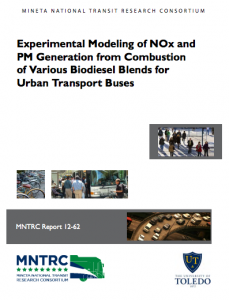A new study has been released by the Mineta National Transit Research Consortium at San José State University that looked at the generation of a number of pollutants during low-temperature combustion (LTC) of several types of biodiesel as compared to ultra-low sulfur diesel (ULSD). The peer reviewed study found that not all biodiesel burns the same. Biodiesel produced using certain feedstocks produced less pollution that other feedstocks under specific combustion conditions.
 “Experimental Modeling of NOx and PM Generation from Combustion of Various Biodiesel Blends for Urban Transport Buses,” also found that biodiesel may also reduce the size and number of soot particles. The research results led the authors to recommend that energy policies and environmental regulations should promote the use of “better” biodiesel feedstocks and blending ratios to optimize combustion efficiency and environmental and environmental sustainability.
“Experimental Modeling of NOx and PM Generation from Combustion of Various Biodiesel Blends for Urban Transport Buses,” also found that biodiesel may also reduce the size and number of soot particles. The research results led the authors to recommend that energy policies and environmental regulations should promote the use of “better” biodiesel feedstocks and blending ratios to optimize combustion efficiency and environmental and environmental sustainability.
The study focused on generation of nitrogen oxides (NOx), particulate matter (PM) and carbon emissions from LTC of different grades of biodiesel (B0, B20, B50, and B100) from three different feedstocks: soybean methyl ester, tallow oil and waste cooking oil. The study found that biodiesel containing more unsaturated fatty acids emitted higher levels of NOx than the biodiesel with more saturated fatty acids. As such, the authors called for the use of feedstocks with lower amounts of unsaturated fatty acid methyl esters such as tallow oil and waste cooking oil.
In terms of performance, the report found that a bus running on B5 was found to perform similarly with a bus running on ultra-low sulfur diesel while drivability was not an issue.
Principal investigator Dr. Ashok Kuma noted, “Biodiesel is being industrialized as one of the potential sources of sustainable energy for transportation in the future. This study provides additional justification for the use of biodiesel as an alternative fuel compared to regular diesel.”
Kuma added that it is recommended that governments consider using particular blends of biodiesel in urban and commercial vehicles to enhance the quality of air and to promote healthy living. Meanwhile, agriculture departments should publish guidelines for farmers for growing environmentally friendly biodiesel feedstock.











